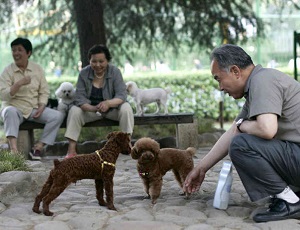Pet Food—China’s Newest Frontier for Foreign Investment?
 SHANGHAI – Business opportunities created in the wake of tragedy can be an uncomfortable subject for discussion, but few can deny the power of scandals to reshape markets and alter consumer behavior. When the tainted infant formula scandal hit China in 2008, causing six deaths and 300,000 cases of illness, it set off a wave of Chinese parents panic-buying foreign-made formula and “formula tourism” to Hong Kong and other destinations. As a result, despite China’s best efforts to rehabilitate its domestic dairy market, foreign brands still hold a 60 percent share of total sales of infant formula. Recently, Chinese consumers have been given yet another reason to fear for the safety of what their loved ones are eating—but this time it’s their pets.
SHANGHAI – Business opportunities created in the wake of tragedy can be an uncomfortable subject for discussion, but few can deny the power of scandals to reshape markets and alter consumer behavior. When the tainted infant formula scandal hit China in 2008, causing six deaths and 300,000 cases of illness, it set off a wave of Chinese parents panic-buying foreign-made formula and “formula tourism” to Hong Kong and other destinations. As a result, despite China’s best efforts to rehabilitate its domestic dairy market, foreign brands still hold a 60 percent share of total sales of infant formula. Recently, Chinese consumers have been given yet another reason to fear for the safety of what their loved ones are eating—but this time it’s their pets.
Tainted dog treats sourced from China are the latest food scandal to make headlines, after being linked to more than 1,000 dog deaths as of May, 2014. The U.S. FDA has received more than 4,800 reports of pet illnesses reputedly linked to tainted jerky, most of which concern Chinese-made chicken, duck and sweet potato treats. The agency has been investigating claims related to tainted jerky since 2007, when a massive recall was issued implicating Chinese producers.
In response to consumer pressure, Petco became the first U.S. pet food chain to stop selling Chinese-made treats in late May of this year, soon followed by rival PetSmart. Both retailers are now rushing to pull the products from their shelves. Meanwhile, a Facebook group called Animal Parents Against Pet Treats and Food Made in China has received over 17,000 likes, and is actively campaigning against products imported from China.
But what no one seems to be asking is how this might affect China’s own considerable market for pet products. Will Chinese pet owners be making special trips abroad to load up on kibble?
In 2012, China surpassed Japan as the world’s third-largest pet care market, with a total pet population of 30 million. According to Euromonitor statistics, about 33 million households keep a dog or cat. All these pets translate into big spending to keep them happy, healthy and looking good.
Chinese pet-owners spent RMB7.84 billion on pet care in 2012, and this number is predicted to rise 64 percent by 2017, to RMB12.9 billion. The majority of these sales take place in independent pet shops, though chain stores and e-commerce sites have made significant market inroads. Beijing alone features two pet markets, about 20 boutique shops, over 30 agencies and nearly 400 retail shops.
At present, the Chinese pet care market is already dominated by foreign brands, who benefit from well-developed distribution networks and strong brand recognition. Royal Canin Au Yu (Shanghai) Pet Food Co. Ltd. ranks first in dog food sales, at RMB451 million in 2012; the China subsidiary of U.S. food giant Mars, Inc. ranks first in cat food, with retail sales of RMB330 million in 2012.
Though consumer spending on pet-care products in China is still dwarfed by developed countries, it is growing more than twice as fast than in the U.S., as established brands continue to promote consumer awareness of the advantages of dry pet food (less than 10 percent of pet-owning households feed their pets with commercial pet food). Dog food is expected to grow at a year-over-year rate of 9 percent and reach retail sales of RMB3.0 billion by the end of 2018. Meanwhile, cat food is predicted to increase by 8 percent and reach RMB 1.3 billion in sales over the same period. Pet food accounts for approximately 37 percent of the total pet care industry.
The extraordinary growth of the Chinese pet care industry is generally attributed to growing affluence in Chinese society, but can also be correlated with certain demographic trends. On one hand, China’s population is rapidly aging, spurring the purchasing of companion animals. On the other, the growing number of Chinese couples opting to forgo parenthood is also driving up pet ownership (in 2012 there were an estimated 49 million couples without children).
Foreign investors from France, Japan, Germany and the U.S. have been quick to seize opportunities in the pet care industry in China, investing in everything from pet food, to veterinary clinics, to specialized online retailers. In May of this year, pet product e-retailer Boqii.com secured US$25 million from an undisclosed U.S.-based investment firm. The site claims to have more than 3 million registered users.
It is too early to tell whether Chinese purchasing behavior will be influenced by the tainted pet food scandal, but it is a safe bet to predict that foreign brands will be the greatest beneficiaries of this tragedy. Chance would have it that the 17th meeting of Pet Fair Asia is to be held in China this year, at the Shanghai World Expo Exhibition & Convention Center, over August 21-24. It seems too much of a coincidence, however, that at the third annual Petfood Forum China, to take place as part of the larger Pet Fair Asia conference, events will be specifically centered on the theme of Nutrition, Ingredients and Formulation.
Asia Briefing Ltd. is a subsidiary of Dezan Shira & Associates. Dezan Shira is a specialist foreign direct investment practice, providing corporate establishment, business advisory, tax advisory and compliance, accounting, payroll, due diligence and financial review services to multinationals investing in China, Hong Kong, India, Vietnam, Singapore and the rest of ASEAN. For further information, please email china@dezshira.com or visit www.dezshira.com.
Stay up to date with the latest business and investment trends in Asia by subscribing to our complimentary update service featuring news, commentary and regulatory insight.
Related Reading
 Industry Specific Licenses and Certifications in China
Industry Specific Licenses and Certifications in China
In this issue of China Briefing, we provide an overview of the licensing schemes for industrial products; food production, distribution and catering services; and advertising. We also introduce two important types of certification in China: the CCC and the China Energy Label (CEL). This issue will provide you with an understanding of the requirements for selling your products or services in China.
New Restrictions for Foreign Dairy Makers in China
Stricter Chinese Food Quality Standards – Or Protectionism?
China Introduces New Consumer Protection Law
- Previous Article China’s 2014 State Policy on Rural Development and the Agriculture Industry: Investment Implications
- Next Article Trends in China’s E-Commerce Market



























